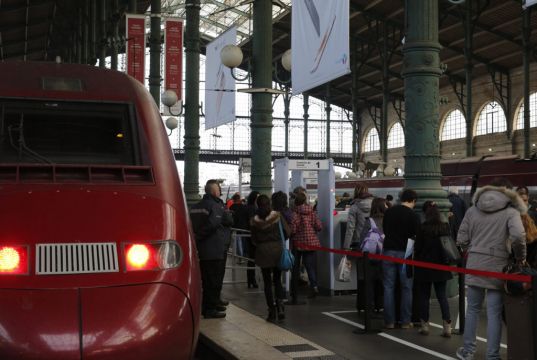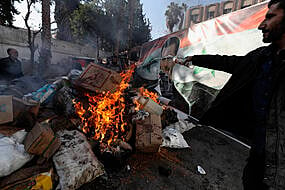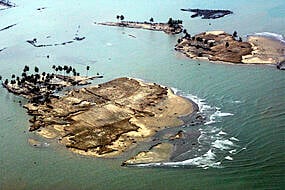An operative of so-called Islamic State listened silently as a Paris judge detailed his alleged plot to unleash mass slaughter on a high-speed train before he was tackled and subdued by American tourists whose heroics inspired a Hollywood film.
Opening a month-long trial for Ayoub El Khazzani, the judge said the 31-year-old Moroccan with ties to a notorious terror mastermind intended to “kill all the passengers” aboard the Amsterdam to Paris train in 2015 but “lost control of events”.
One of the Americans who tackled the bare-chested gunman, who was laden with an arsenal of weapons and shot another passenger, told investigators that he seemed high on drugs and “completely crazy”, the judge said.
A lawyer for the two US servicemen and their friend, whose electrifying capture of El Khazzani inspired Clint Eastwood’s movie The 15:17 To Paris, said their heroics during the drama on August 21 2015 thwarted a “slaughter”.

“This terror attack could have killed up to 300 people based on the number of ammunition that was found on the terrorist and in his bag,” said the lawyer, Thibault de Montbrial.
With El Khazzani in court and watched by security officers, the trial opening was largely taken up with procedural issues including whether Eastwood’s presence is needed.
That question was not immediately resolved.
The actor-director has so far not responded to a summons.
El Khazzani boarded the train in Brussels armed with a Kalashnikov, nine clips with 30 rounds each, an automatic pistol and a cutter, according to investigators.
He is charged with attempted terrorist murder.
If convicted, he faces a maximum sentence of life in prison.
His lawyer, Sarah Mauger-Poliak, said El Khazzani “regrets having allowed himself to become indoctrinated” by extremist propaganda and wants “to demonstrate his remorse”.

Three others, who were not on the train, are being tried as alleged accomplices.
Bilal Chatra, 24, an Algerian member of IS, would have been the second man on the train but dropped out of the plot a week earlier, it is alleged.
He left Syria for Europe a week before to set up the exit route, prosecutors said.
Mohamed Bakkali allegedly sheltered the attackers in Budapest, Hungary, which he denies.
The two were arrested in Germany in 2016.
A third man, Redouane El Amrani Ezzerrifi, allegedly piloted a boat to help in their return to Europe.
The trial ties into the massacre of 130 people in Paris three months later, on November 13 2015, at the Bataclan music hall and restaurants and cafes.
The suspected mastermind of those assaults, Abdel Hamid Abaaoud, also worked behind the scenes in the train attack, according to the prosecution.

Prosecutors say Abaaoud and El Khazzani travelled together from Syria to Belgium and holed up with Chatra in a Brussels apartment.
French special forces killed Abaaoud days after the Bataclan attack.
Once aboard the train, El Khazzani lingered in a toilet between carriages and emerged bare-chested with the Kalashnikov.
One waiting passenger struggled with the attacker, then a French-American, Mark Magoolian, wrestled the Kalashnikov away – before being shot himself by a pistol.
Spencer Stone, then a 23-year-old US airman, has said he was coming out of a deep sleep when the gunman appeared.
He said Alek Skarlatos, then a 22-year-old US National Guardsman recently back from Afghanistan, “just hit me on the shoulder and said, ‘Let’s go'”.
The men, all from California and following what Mr Skarlatos has said was “gut instinct”, snapped into action.
Mr Stone and Mr Skarlatos moved in to tackle the gunman, helped by a third man, Anthony Sadler, 23, then a student.

Mr Stone said he choked El Khazzani unconscious.
A British businessman also joined the fray.
Mr Stone, whose hand was injured by the cutter, is also credited with saving Mr Magoolian, whose neck was squirting blood.
Mr Stone said he “just stuck two of my fingers in his hole and found what I thought to be the artery, pushed down and the bleeding stopped”.
The train rerouted to Arras, in northern France, where El Khazzani was arrested.





